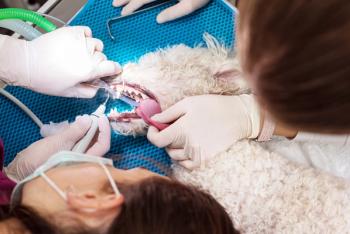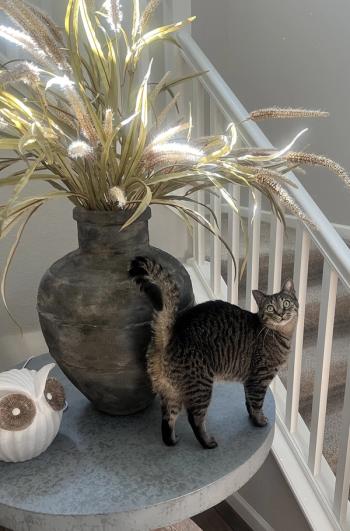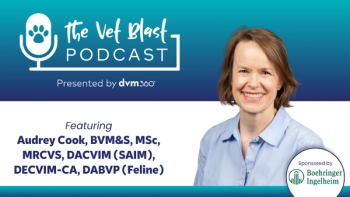
Haiti's hard recovery
Port-au-Prince, Haiti - In the good times, before the earthquakes pounded the impoverished island, thousands of dogs roamed free.
PORT-AU-PRINCE, HAITI — In the good times, before the earthquakes pounded the impoverished island, thousands of dogs roamed free.
The veterinary care that was then available was considered basic for Haiti's estimated 6 million poultry and 5 million livestock.
As the country recovers from a devastating round of earthquakes triggered by a 7.0 quake in late January, veterinarians like Dr. Juan Carlos Murillo of the World Society for the Protection of Animals (WSPA) try to make the most of a bad situation. In fact, Murillo is trying to build a lasting animal-health program for the country.
Animals in Haiti are not much worse off than they were before the earthquake, Murillo says. Feeding animals and providing medical care always were a struggle in the poor nation. Groups like Heifer International and the Christian Veterinary Mission — which helped facilitate rabies vaccinations for about 20 percent of Haiti's stray dog populations last year alone — have worked in Haiti for years to improve animal health. But the problems that existed have been exacerbated by Haiti's current turmoil and a severe lack of available food.
"For animals in disasters, it's exactly the same situation as everywhere else," says Murillo, who is WSPA's longest-serving disaster management veterinary officer. "But in Haiti, the social and economical position makes it more challenging to work there."
Roaming animals are commonplace on the streets of Port-au-Prince. But some dogs and many livestock were owned and cared for, and now, in the weeks after the earthquake, animals that fled the city are returning to their homes in search of their owners, Murillo says.
"Many of them are reuniting with owners and these owners, when asked if they are interested in getting medical attention for their animals, I can tell you almost 100 percent of them say okay," Murillo says. "Animals, no matter what relationship they have, the thing is they belong to people; and they're working for them or they provide some food or money through a sale. The pig will pay for the school of some child for next year. Then, there is an emotional component, too."
But animal owners barely have food enough for themselves, and dogs especially are being left to scavenge. Animal injuries from the earthquake are scarce, but lack of food, animal diseases and parasites, and behavioral issues present a whole other set of problems, Murillo says.
"The problem in Haiti is not strictly due to animals that were affected in the first few hours of the earthquake. The problem now is that food is lacking. First the people need to survive, and then they will go to the animals," he explains. "But in this situation, you need to compete for food to survive. It's unfair for them to have to compete with diseases on top of looking for food."
Growing public-health threat
There are many concerns about zoonotic diseases because of the close quarters the roaming dogs have to people in makeshift housing, but Murillo says his biggest worry is the competition dogs face for food scraps.
"The situation is that animals could fight among themselves for something and create noise," Murillo says. "And if someone tries to break up a fight between dogs, they could get injured."
In the midst of the existing and new hardships, though, Haiti's earthquake has opened some new doors, Murillo says.
"We have a very good opportunity to set up, with the government, a long-term plan to develop veterinary clinics so animals can get proper attention and owners can find out more about prevalent diseases," Murillo says. "You cannot avoid an event. You cannot stop a hurricane, earthquake or flood. But what you can reduce, or even avoid, are the consequences."
WSPA and the International Fund for Animal Welfare (IFAW) co-founded the Animal Rescue Coalition of Haiti (ARCH), which is a joint effort by numerous animal care organizations to provide aid in Haiti. Nineteen organizations — including the American Veterinary Medical Association (AVMA), the American Veterinary Medical Foundation, the Humane Society of the United States, the American Humane Association and the American Society for the Prevention of Cruelty to Animals — now make up the ARCH organization, which plans to spend more than $1.2 million in Haiti on long- and short-term rebuilding plans.
More than 20 ARCH team members are on the ground in Haiti, and ARCH leaders are working with Haitian leaders to identify the most effective plan to rebuild and reinforce the nation's veterinary infrastructure. Costs of the plan so far will probably exceed the $1.2 million ARCH raised, but the coalition says any additional funding will be compiled by ARCH member organizations.
Groups like the Christian Veterinary Mission also are working on the ground and with the government, though leading members could not be reached by press time.
Keith Flanagan, DVM, of Christian Veterinary Mission has been working in Haiti for more than 20 years and has recounted his experiences following the earthquake in a blog on the group's Web site. He and his associates are trying to help Haitian residents they know well, while also trying to coordinate animal-health. So far, they have endured power outages, carjackings and injuries, all while trying to accommodate and aid relief workers. Flanagan is joined by Christian Veterinary Mission's Kelly Crowdis, DVM, who has worked in Haiti full time since 2006. They want to create better animal-control programs and infrastructure, acquire better medicine and equipment, create new animal-health programs and set up continuing-education programs for Haitian veterinarians and village-level technicians.
There has been no official call for veterinarian volunteers outside of those already in Haiti, but additional aid has been provided by veterinarians in the U.S. Army's 43rd Medical Detachment (veterinary services), primarily to inspect food and water entering the country and to care for search-and-rescue dogs. Food testing will focus on biological contaminants and insect or rodent infestation, according to the unit.
Humane Society International (HSI) and the Humane Society of the United States (HSUS) have sent volunteers to provide animal aid.
Monetary donations for animal-relief efforts are being collected through the WSPA, the IFAW, the American Veterinary Medical Foundation, the Christian Veterinary Mission and Heifer International.
Newsletter
From exam room tips to practice management insights, get trusted veterinary news delivered straight to your inbox—subscribe to dvm360.




